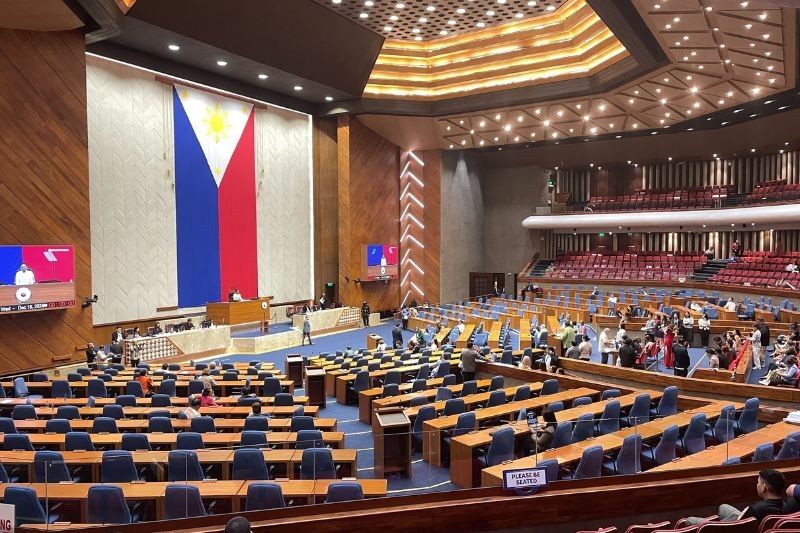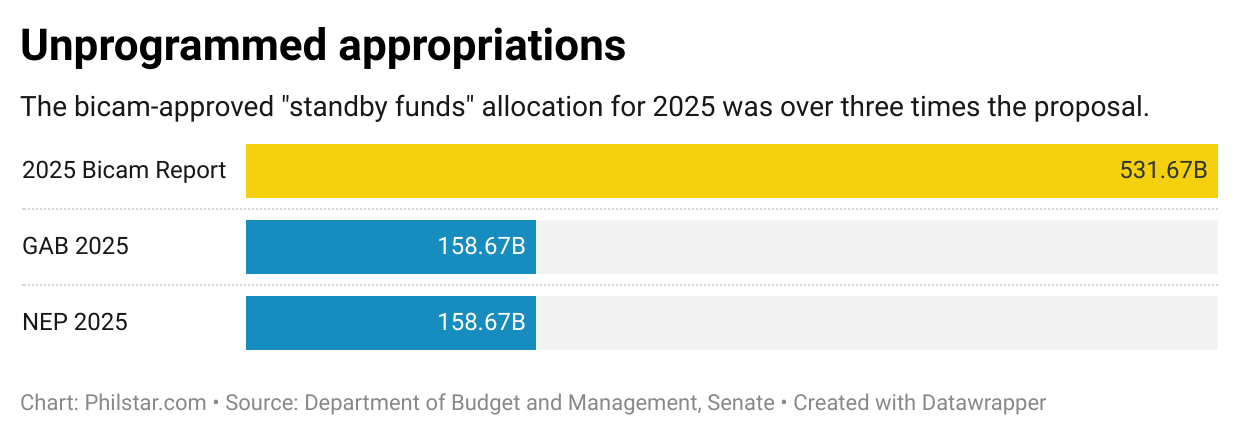Zero-sum game: Who wins in the proposed 2025 national budget?

Second of a two-part special report on the proposed 2025 national budget. Read the first story here.
MANILA, Philippines — President Ferdinand Marcos Jr. was originally scheduled to sign the P6.352 trillion national budget for 2025 on Friday, December 20, following its stamp of approval by Congress.
However, the executive branch decided to delay the signing and veto certain budget allocations, citing concerns that some did not align with the country’s priorities. For an agency to receive an increase in funding, it often meant cuts elsewhere.
Philstar.com takes a closer look at how Congress divided the country’s public funds, focusing on the agencies and budget items that saw significant boosts, as well as the controversies surrounding these decisions.
Unprogrammed funds
Since Marcos took office in 2022, unprogrammed appropriations — also known as standby funds — have consistently exceeded the executive branch's proposals.
For the 2023 national budget, Congress dramatically increased unprogrammed funds by 37.23%, raising them from the originally requested P588.162 billion to P807.162 billion. An even larger increase was made for 2024.
Under the 2024 National Expenditure Program (NEP), unprogrammed funds were initially set at P281.908 billion. However, upon ratification of the 2024 General Appropriations Bill (GAB) by both houses of Congress, these funds surged to P731.449 billion — more than doubling the original proposal.

In the Marcos administration's third year of budget deliberations, the P531.665 billion standby funds approved by the bicam committee for 2025 exceeded three times the P158.665 billion proposed in the 2025 GAB and NEP. These unprogrammed funds received the largest additional allocation of P373 billion compared to other budget items and agencies.
What these funds are. Unprogrammed funds, as their name suggests, are not allocated to specific predetermined programs. Instead, they represent a rather flexible public fund that the government can utilize according to priority initiatives, with spending determined by the executive's discretion.
The funds may be deployed only under specific conditions: when revenue collection exceeds targets, additional grants are received, or foreign funds are generated.
For this reason, the unprogrammed appropriations have been heavily criticized, with some calling them a form of “pork barrel.”
Department of Public Works and Highways (DPWH)
Second to the unprogrammed funds is the DPWH. The bicam committee inserted an additional P288.648 billion to the proposed P825.115 billion of the 2025 GAB. This brings the agency's total budget allocation to around P1.113 trillion, marking a roughly 11.5% increase from its 2024 budget of P997.885 billion.
Some lawmakers and civil society groups were dismayed by this move since the budgets of the Department of Education (DepEd) and Commission on Higher Education (CHED) were slashed from the 2025 NEP and GAB.
They said it violates Article 14, Section 5 of the 1987 Constitution, which states that education should be given the “highest budget priority.”

Lower chamber’s defense. Rep. Jefferson Khonghun (Zambales, 1st District) defended these budget cuts, clarifying that the education sector’s budget is a combination of all education-related agencies in government and not just DepEd.
These include CHED, the Technical Education and Skills Development Authority (TESDA), and state universities and colleges, among others. With this rationale, he argued that the DPWH's budget is not larger than that of the education sector.
Khonghun gave the media a copy of the breakdown, but upon cross-checking with the Senate’s copy of the bicam report, the numbers did not match. An initial computation with the Senate’s copy shows that the budget for education-related agencies was still smaller than that of DPWH.
Philstar.com requested the lower chamber’s copy of the bicam report from the appropriations committee to clarify these discrepancies. However, a copy has yet to be furnished.
Flood control projects. During the agency's budget deliberations, both the House and Senate also confronted the DPWH over the billions of pesos allocated for flood control projects that appear ineffective, as households are often vulnerable to floods and landslides during typhoons, either being submerged in floodwater or debris.
Congress
The legislative branch secured the third-largest increase in additional funds, with a P18.793 billion boost from the 2025 GAB, increasing the Congress’ budget to P50.088 billion. Most of this allocation was directed to the over 300-member House, with only a small portion granted to the Senate.
This represents a slight increase over its current budget of P44.096 billion.

The media has been pressing lawmakers on which agencies, receiving less than the proposed budgets, were tapped to fund this increase. However, House members of the bicam committee have said they are either unaware of the details or do not recall the specifics.
One of the most contentious issues before Congress is the budget for the Ayuda sa Kapos ang Kita Program (AKAP), which provides financial assistance. While the Department of Social Welfare and Development (DSWD) will serve as the implementing agency, P21 billion was “allocated” to the House and P5 billion to the Senate.
Before the bicam meetings, there was no split in the AKAP budget between the two chambers. The Senate even deleted it and realigned the program’s budget to a similar DSWD program.
This also drew criticism, with many questioning it as yet another form of pork barrel to be used for the 2025 midterm elections. Lawmakers have denied this, explaining that Congress does not choose the beneficiaries but only suggests them through its “oversight power.”
Department of National Defense (DND)
Following the additional allocation of P10.597 billion for local government units, the DND received the next highest increase, with an additional P8.857 billion compared to the 2025 GAB.

These funds were primarily given to the Armed Forces of the Philippines, particularly the Philippine Army and Navy.
The DND is also one of the government agencies with the highest budget, as the bicam approved a P271.924 billion budget for the agency in 2025, up from its current P242.395 billion.
State Universities and Colleges (SUCs)
After student rights groups and educational institutions called for the restoration of around the P14-billion budget cut for SUCs, the bicam approved a partial increase of P7.233 billion to the P114.925 billion proposed in the 2025 GAB. This brought the budget for SUCs to P122.158 billion.
The net increase stems from the P8.226 billion in additional funds allocated across 116 SUCs, offset by a P993 million decrease, which was largely shouldered by UP.
However, this increase is still not a full restoration and remains significantly lower than the total allocated budget of P132.929 billion in 2024.

Other notable increases. Another government agency that saw significant increases in the 2025 GAB was the Office of the President, which received an additional P5.4 billion.
Compared to the 2025 NEP, the Department of Health also received P30.811 billion more, while the Department of Agriculture was given P23.616 billion more. The bicam-approved budgets for these agencies are P254 billion and P152.618 billion, respectively.
These budgets are just some of the agencies and line items that saw the largest fund increases in the bicam report compared to the 2025 GAB.
- Latest
- Trending
































